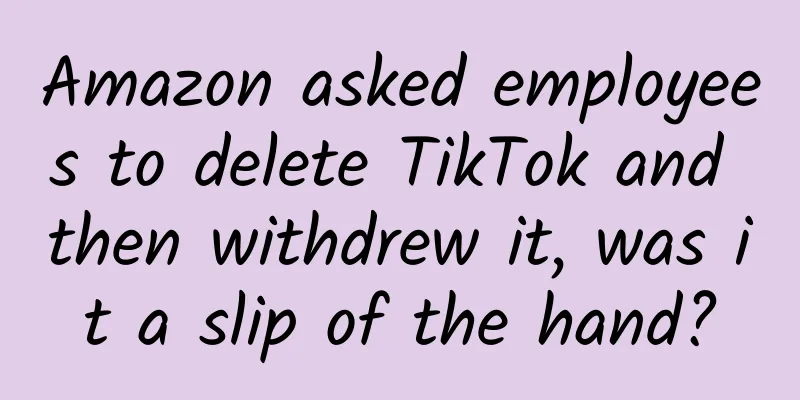Amazon asked employees to delete TikTok and then withdrew it, was it a slip of the hand?

|
Last Friday local time, the New York Times reported that Amazon asked employees to delete TikTok from their mobile devices due to security risks. In its first email to employees on Friday morning, Amazon reportedly said: "Due to security concerns, use of the TikTok app on mobile devices accessing Amazon email is no longer allowed. “If you have TikTok on your device, you must delete it by July 10 to retain mobile access to your Amazon email. Currently, using TikTok through your Amazon laptop browser is allowed.” New York Times reporter Taylor Lorenz posted a screenshot of the email on Twitter. However, there was a reversal. On July 11, local time, an Amazon spokesperson reportedly said that the email was "sent to the wrong person." An Amazon spokesperson said: "The previous email to employees was an error and Amazon's current policy towards TikTok has not changed." Recently, due to a new feature in iOS 14, TikTok was reportedly found to access user clipboard data while running in the background, which could expose passwords or other sensitive data. It is unclear how long this behavior has existed in the application. On July 7 local time, US Vice President Pence said that due to national security and data privacy issues, the United States will continue to take a "tough stance" against companies such as TikTok. The day before, US Secretary of State Mike Pompeo told Fox News that the Trump administration is considering taking action to ban social media apps such as TikTok. He also said that the American people should be more vigilant about using TikTok, but he did not specify what specific measures the United States will take. TikTok has since denied the U.S. government's allegations that it threatens national security and violates data privacy. It’s reportedly not entirely clear how government authorities would go about banning the app, though glitches and insecurity have thrown the TikTok community into a state of chaos. A TikTok spokesperson responded to Amazon's decision to order employees to remove the app, saying in a statement: "While Amazon did not communicate with us prior to sending their email and we still do not understand their concerns, we welcome a dialogue between the two companies so that we can address any issues they may have and enable their teams to continue to engage with our community." A TikTok spokesperson also said: "Thousands of Americans seek entertainment, inspiration, and communication on TikTok, including many Amazon employees and contractors who are fighting on the front lines of the fight against the epidemic. We are proud of this." It is reported that TikTok is a short video software owned by ByteDance, which officially entered the US market in 2016 as the international version of Douyin. Data from market research firm SensorTower shows that as of the end of April this year, the United States is TikTok's second largest market in the world. Currently, TikTok has been downloaded more than 165 million times in the United States, accounting for about 50% of the total U.S. population. On average, American users open the app eight times a day, and each person uses it for an average of about five minutes each time. Among so many users, teenagers are the main user group of TikTok in the United States. In 2019, TikTok stated that among its 26.5 million active users in the United States, about 60% of users were aged 16-24. Moreover, TikTok, as an independent subsidiary of ByteDance, does not operate in China. In 2019, ByteDance completely separated TikTok and Douyin. In addition to Chinese users being unable to use TikTok, ByteDance's internal technical team also set up a firewall. In addition, employees who work in China and whose work content is for the Chinese market are unable to obtain access to TikTok's key data. Despite this, TikTok is facing considerable trouble. It has been subject to extra strict regulation in the United States and has indeed caused a lot of controversy recently due to some of its actions. For example, Silicon Star reported that TikTok abused iOS clipboard permissions and frequently accessed the clipboard without the user's knowledge, which became one of the evidences that TikTok was violating privacy. However, TikTok said that this was to "fight spam accounts" and stopped this practice after the incident was exposed. Not only that, the US military has banned soldiers from installing the app, and US supervisory agencies have always "distrusted" TikTok. Since 2019, US supervisory agencies have stepped up their scrutiny of TikTok, mainly focusing on threats to national security and violations of data privacy. For example, in February 2019, the U.S. Federal Trade Commission (FTC) sued TikTok, saying that TikTok illegally collected personal information of children under the age of 13 without parental consent. In response, the FTC issued a $5.7 million fine to TikTok. In response to repeated accusations from the U.S. government, TikTok has tried to establish an image of maintaining data privacy in many ways, including setting up a transparency center, separating domestic and foreign markets, and hiring local executives. In March 2020, TikTok established a transparency center in Los Angeles, USA, and plans to open a second transparency center in Washington. Not only in the United States, when India banned the use of TikTok, Indian Internet celebrities working through the platform suffered heavy losses, such as "Chicken Leg Brother". According to a report by the Washington Post on July 11 local time, Kamash, a 41-year-old gym owner from India, was previously famous for sharing videos of eating chicken legs on TikTok. In just a few months, he attracted nearly 7 million fans worldwide. India is TikTok's largest user market. Today, many Indian big V users are depressed that the ban has made them lose their main source of income, and now they have to find a new platform. This article is reproduced from Leiphone.com. If you need to reprint it, please go to Leiphone.com official website to apply for authorization. |
<<: Following Apple, another mobile phone manufacturer no longer provides chargers
Recommend
The long-awaited Windows version of WeChat
WeChat for Windows is finally coming out. Mac use...
Summary of common tools and third-party libraries for Android development
My name is Ryan Cooke and I work on the Core Expe...
Pinduoduo’s bargaining logic and strategic marketing methods!
Many people often receive price-cutting links fro...
What is this thing in the grass that looks like leek?
In the green belts of many cities, you can often ...
Use these 3 methods to impress your users
Before starting the article, let's do a small...
Food prices are going to rise? Wait, don’t rush to grab them!
This article was first published by Hunzhi (WeCha...
Xiaomi App Store Ads Creative Label Settings
"Except for Apple, Xiaomi's user quality...
Shengtao E-commerce: 2022 anchor advanced training online column worth 980 yuan
Shengtao E-commerce: 2022 anchor advanced trainin...
Song Guangming's face yoga plastic surgery
Song Guangming's facial yoga freehand plastic...
The bidding promotion effect is not good. Why is the bidding promotion ineffective?
In many companies, bosses have a mindset: the mor...
Can't watch TV series without double speed? What's wrong with young people today...
Have you noticed that nowadays you rarely watch a...
To get out of the traffic winter in 2019, operators must know two models
The more severe the economic environment, the mor...
How to carry out promotion operations? Share 10 tips!
The era of the entire network has arrived, and on...
New features of iOS 9 SDK that developers need to know
[[146244]] Flowers look the same every year, but ...









